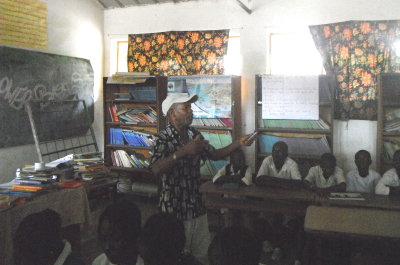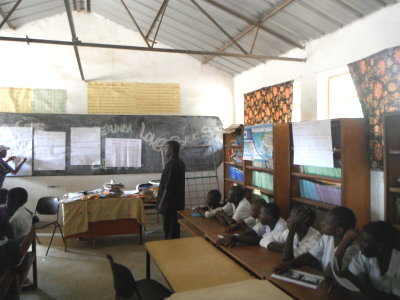Serrekunda Lower Basic School activities in June and July 2012
by Bolong Touray and Lasana Touray
Serrekunda Lower Basic School has voluntarily participated in the pilot activities carried forward by Mundus maris commissioned by the EAF-Nansen / FAO. Following on from the action plan agreed among school during the review workshop end May, still before the end of the school year, we have implemented the following:
In class exercises
 During the first week and the third week of June 2012, we have organised jointly exercises in the Serrekunda school library. The exercises are of several kinds
During the first week and the third week of June 2012, we have organised jointly exercises in the Serrekunda school library. The exercises are of several kinds
(i) imaginary drawings on the integrity of the ecosystem and the precautionary approach in the Arts and craft course;
(ii) commented texts and reports on field trips and on the key principle regarding the precautionary approach in the English course;
(iii) a couple of questions and answer sessions between the teachers and the pupils using the two posters of the teaching kit (see various photos regarding exercise in Serrekunda lower basic school).
 A piece of drama that was first performed by the pupils during the validation workshop has been improved and finalised, before it is going to be presented to a wider public from the school community of more than 4000 pupils at the end of July.
A piece of drama that was first performed by the pupils during the validation workshop has been improved and finalised, before it is going to be presented to a wider public from the school community of more than 4000 pupils at the end of July.
We have developed a stock of materials available with the master teacher such as: files used for surveys during outside observations, drawings, reports done by the pupils giving their impressions after the field trip.

During all June, we did our best in order to ensure that all the pupils have clearly understood the five key principles about the ecosystem approach to fisheries and can make a good interpretation of the EAF-Nansen poster.
Within the SES course, the pupils were thus invited to come to the board and demonstrate what they had learnt.
This approach is lively and dynamic and considered by pupils an opportunity to escape from exam stress.
The first and second weeks of July were chosen by the school inspectors to establish a first global assessment on the process and the achievements.
The inspectors wanted to monitor the process prior to the closure of schools before the end of July. It is important for the inspector to develop his own evaluation of the pilot activities, so as to communicate them to the Ministry of Education for the annual assessment given to each school.
In this context, the participation in the pilots is considered an important added value for schools (see the inspector interview).
Field observations
Brufut has lost its former role in the fisheries as a result of an impressive and fast urbanisation process (hostels and residences occupying gradually the seaside). Given the long distance from Serrekunda to Tanji and Gunjur, Serrekunda Lower Basic School’s field observations were organised in Serrekunda and Bakau local markets. We also facilitated discussions between teachers and pupils and scientists coming from the Fisheries Department headquarters in Banjul.
Given our travel constraints, we end always with exercises in classrooms. In fact, beside the two posters provided in the teaching kit, the main source of inspiration for exercises are the data collected in the excursions and from the fisheries administration agents/ officials and the stakeholders, using also the fish rulers (see model to the left).








